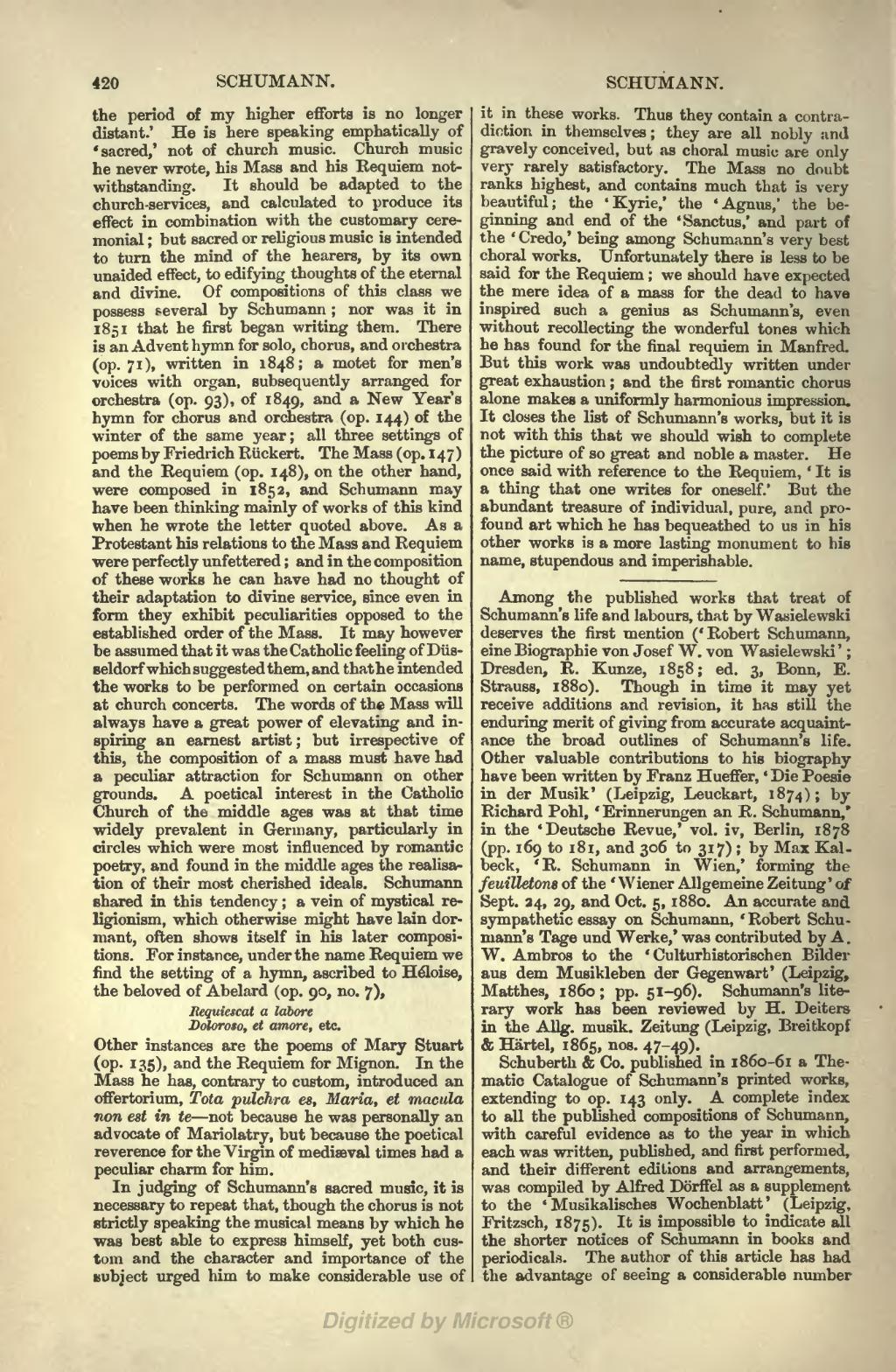the period of my higher efforts is no longer distant.' He is here speaking emphatically of 'sacred,' not of church music. Church music he never wrote, his Mass and his Requiem notwithstanding. It should be adapted to the church-services, and calculated to produce its effect in combination with the customary ceremonial; but sacred or religious music is intended to turn the mind of the hearers, by its own unaided effect, to edifying thoughts of the eternal and divine. Of compositions of this class we possess several by Schumann; nor was it in 1851 that he first began writing them. There is an Advent hymn for solo, chorus, and orchestra (op. 71), written in 1848; a motet for men's voices with organ, subsequently arranged for orchestra (op. 93), of 1849, and a New Year's hymn for chorus and orchestra (op. 144) of the winter of the same year; all three settings of poems by Friedrich Rückert. The Mass (op. 147) and the Requiem (op. 148), on the other hand, were composed in 1852, and Schumann may have been thinking mainly of works of this kind when he wrote the letter quoted above. As a Protestant his relations to the Mass and Requiem were perfectly unfettered; and in the composition of these works he can have had no thought of their adaptation to divine service, since even in form they exhibit peculiarities opposed to the established order of the Mass. It may however be assumed that it was the Catholic feeling of Düsseldorf which suggested them, and that he intended the works to be performed on certain occasions at church concerts. The words of the Mass will always have a great power of elevating and inspiring an earnest artist; but irrespective of this, the composition of a mass must have had a peculiar attraction for Schumann on other grounds. A poetical interest in the Catholic Church of the middle ages was at that time widely prevalent in Germany, particularly in circles which were most influenced by romantic poetry, and found in the middle ages the realisation of their most cherished ideals. Schumann shared in this tendency; a vein of mystical religionism, which otherwise might have lain dormant, often shows itself in his later compositions. For instance, under the name Requiem we find the setting of a hymn, ascribed to Heloise, the beloved of Abelard (op. 90, no. 7),
Requiescat a labore
Doloroso, et amore, etc.
Other instances are the poems of Mary Stuart (op. 135), and the Requiem for Mignon. In the Mass he has, contrary to custom, introduced an offertorium, Tota pulchra es, Maria, et macula non est in te—not because he was personally an advocate of Mariolatry, but because the poetical reverence for the Virgin of mediæval times had a peculiar charm for him.
In judging of Schumann's sacred music, it is necessary to repeat that, though the chorus is not strictly speaking the musical means by which he was best able to express himself, yet both custom and the character and importance of the uubject urged him to make considerable use of it in these works. Thus they contain a contradiction in themselves; they are all nobly and gravely conceived, but as choral music are only very rarely satisfactory. The Mass no doubt ranks highest, and contains much that is very beautiful; the 'Kyrie,' the 'Agnus,' the beginning and end of the 'Sanctus,' and part of the 'Credo,' being among Schumann's very best choral works. Unfortunately there is less to be said for the Requiem; we should have expected the mere idea of a mass for the dead to have inspired such a genius as Schumann's, even without recollecting the wonderful tones which he has found for the final requiem in Manfred. But this work was undoubtedly written under great exhaustion; and the first romantic chorus alone makes a uniformly harmonious impression. It closes the list of Schumann's works, but it is not with this that we should wish to complete the picture of so great and noble a master. He once said with reference to the Requiem, 'It is a thing that one writes for oneself.' But the abundant treasure of individual, pure, and profound art which he has bequeathed to us in his other works is a more lasting monument to his name, stupendous and imperishable.
Among the published works that treat of Schumann's life and labours, that by Wasielewski deserves the first mention ('Robert Schumann, eine Biographie von Josef W. von Wasielewski'; Dresden, R. Kunze, 1858; ed. 3, Bonn, E. Strauss, 1880). Though in time it may yet receive additions and revision, it has still the enduring merit of giving from accurate acquaintance the broad outlines of Schumann's life. Other valuable contributions to his biography have been written by Franz Hueffer, 'Die Poesie in der Musik' (Leipzig, Leuckart, 1874); by Richard Pohl, 'Erinnerungen an R. Schumann,' in the 'Deutsche Revue,' vol. iv, Berlin, 1878 (pp. 169 to 181, and 306 to 317); by Max Kalbeck, 'R. Schumann in Wien,' forming the feuilletons of the 'Wiener Allgemeine Zeitung' of Sept. 24, 29, and Oct. 5, 1880. An accurate and sympathetic essay on Schumann, 'Robert Schumann's Tage und Werke,' was contributed by A. W. Ambros to the 'Culturhistorischen Bilder aus dem Musikleben der Gegenwart' (Leipzig, Matthes, 1860; pp. 51-96). Schumann's literary work has been reviewed by H. Deiters in the Aug. musik. Zeitung (Leipzig, Breitkopf & Härtel, 1865, nos. 47–49).
Schuberth & Co. published in 1860–61 a Thematic Catalogue of Schumann's printed works, extending to op. 143 only. A complete index to all the published compositions of Schumann, with careful evidence as to the year in which each was written, published, and first performed, and their different editions and arrangements, was compiled by Alfred Dörffel as a supplement to the 'Musikalisches Wochenblatt' (Leipzig, Fritzsch, 1875). It is impossible to indicate all the shorter notices of Schumann in books and periodicals. The author of this article has had the advantage of seeing a considerable number
